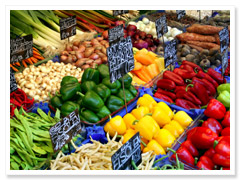Buy local and seasonal food

Eating local and seasonal food supports local producers and the production of crops that are appropriate to our environment. It alleviates the reliance on long-distance transport and refrigeration of foods that are grown thousands of kilometres away. Foods grown in sync with the seasons are more in tune with our intuitive nutritional needs; after all, who wants a cucumber sandwich in the middle of winter?
How to do it now!
Buy & eat local and seasonal food!
Farmers markets are a great place to buy locally produced food and a directory is available from the Australian Farmers' Markets Association or the Melbourne Community Farmers' Markets.
Foods in season throughout the year.
Summer | Autumn | Winter | Spring |
| Apricots | Avocado (Fuerte) | Beetroots | Asparagus |
| Beans | Cabbage (& Brussels Sprouts) | Broccoli | Avocado (Hass) |
| Berries & Currants | Cauliflower | Cabbage (& Brussels Sprouts) | Beetroots |
| Celery | Celery | Cauliflowers | Berries & Currants |
| Cherries | Chestnuts | Celery | Broccoli |
| Corn | Cumquats | Cumquats | Cabbage (& Brussels Sprouts) |
| Cucumber | Figs | Fennel | Corn |
| Eggplants | Ginger | Ginger | Cucumbers |
| Figs | Leeks | Jerusalem Artichokes | Fennel |
| Green pea | Melons | Lemons & Limes | Green, Snap & Snow Peas |
| Leeks | Olives | Olives | Leeks |
| Melon | Parsnips | Parsnips | Lemon & Lime |
| Pears | Pears | Rhubarb | Peppers & Chillies |
| Peppers (& Chillies) | Quinces | Sweet Potatoes | Rhubarb |
| Tomatoes | Sweet Potatoes | Turnips & Swedes | Zucchini & Squash |
| Zucchini & Squash | Tomatoes |
(Southern Australian emphasis)
Grow your own food. The best way to eat local and seasonal food is to use your own backyard! You can have a veggie garden all year round with seasonal vegetables. (See our Grow your own food action).
Why is this action important?
Changing our eating habits is a simple way to reduce our impact on the environment, address climate change (via reduced transport and industrial energy) and support local communities and farmers. You'll benefit from an interesting and diverse diet year round and support organisations like the Australian Farmers' Markets Association, which advocate low-impact farming and produce diversity.
Environment
Local and seasonal produce creates less energy and water being embedded in our foods (through growing, transport and refrigeration), with a corresponding lightening of the contribution to climate change. Seasonal crops are more likely to work with, rather than against, local biological and environmental systems and species, minimising the requirement for pesticides, glasshouses, etc.
Wellbeing
The good sense of eating seasonally aligned (local) food is a well-developed tenet of preventative medical traditions (such as traditional Chinese medicine). Even without applying hard science, intuition and tradition tell us to eat root vegies in winter, sprouting veggies in spring and cooling vegies in summer.
